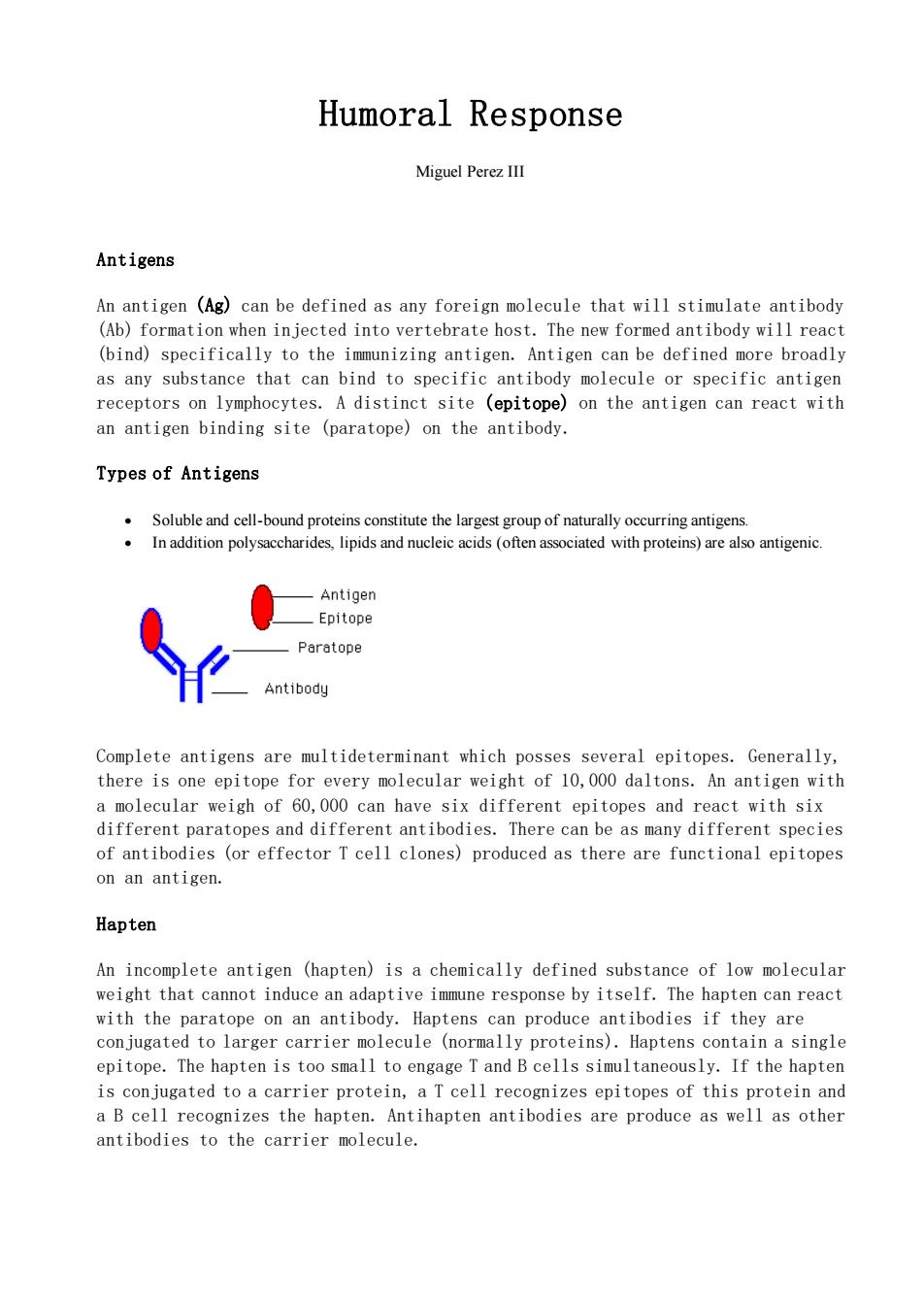正在加载图片...

Humoral Response Miguel Perez IⅢ Antigens can be defined as any foreign molecule that will stimulate antibody into vertbrate host.e (bind)specifically to the immunizing antigen.Antigen can be defined more broadly as any substance that can bind to specific antibody molecule or specific antigen receptors on lymphocytes.A distinct site (epitope)on the antigen can react with an antigen binding site (paratope)on the antibody Types of Antigens .Soluble and cell-bound proteins constitute the largest group of naturally occurring antigens. In addition polysaccharides,lipids and nucleic acids (often associated with proteins)are also antigenic. Antiger Epitope Paratope Antibody Complete antigens are multideterminant which posses several epitopes.Generally, there is one epitope for every molecular weight of 10,000 daltons.An antigen with can have topes and r react with six of antibodies (or effector T cell clones)produced as there are functional epitopes on an antigen. Hapten An incomplete antigen (hapten)is a chemically defined substance of low molecular weight that camnot induce an adaptive ime response by itself The hapten can react with the paratope on an antibody.Haptens can produce antibodies if they are con jugated to larger carrier molecule (normally proteins).Haptens contain a single epitope.The hapten is too small to engage T and B cells simultaneously.If the hapten is conjugated to a carrier protein,a T cell recognizes epitopes of this protein and a B cell izes the hapten Antihapten antibodies are produce as well as other antibodies to the carrier molecule. Humoral Response Miguel Perez III Antigens An antigen (Ag) can be defined as any foreign molecule that will stimulate antibody (Ab) formation when injected into vertebrate host. The new formed antibody will react (bind) specifically to the immunizing antigen. Antigen can be defined more broadly as any substance that can bind to specific antibody molecule or specific antigen receptors on lymphocytes. A distinct site (epitope) on the antigen can react with an antigen binding site (paratope) on the antibody. Types of Antigens • Soluble and cell-bound proteins constitute the largest group of naturally occurring antigens. • In addition polysaccharides, lipids and nucleic acids (often associated with proteins) are also antigenic. Complete antigens are multideterminant which posses several epitopes. Generally, there is one epitope for every molecular weight of 10,000 daltons. An antigen with a molecular weigh of 60,000 can have six different epitopes and react with six different paratopes and different antibodies. There can be as many different species of antibodies (or effector T cell clones) produced as there are functional epitopes on an antigen. Hapten An incomplete antigen (hapten) is a chemically defined substance of low molecular weight that cannot induce an adaptive immune response by itself. The hapten can react with the paratope on an antibody. Haptens can produce antibodies if they are conjugated to larger carrier molecule (normally proteins). Haptens contain a single epitope. The hapten is too small to engage T and B cells simultaneously. If the hapten is conjugated to a carrier protein, a T cell recognizes epitopes of this protein and a B cell recognizes the hapten. Antihapten antibodies are produce as well as other antibodies to the carrier molecule